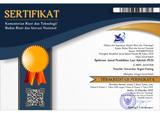The Relationship Between Peers and Learning Interest of Citizens Learning the Package C Program at SPNF SKB Sijunjung
 ), Jalius Jalius(2),
), Jalius Jalius(2), (1) Universitas Negeri Padang
(2) Universitas Negeri Padang
 Corresponding Author
Corresponding Author
DOI : https://doi.org/10.24036/spektrumpls.v8i4.110055
Full Text:
 Language : en
Language : en
Abstract
This research was motivated by the low interest in learning of the members of learning the package C program at SPNF SKB Sijunjung, this is thought to be due to the negative influence exerted by peers. This study aims to: 1) describe peer influence; 2) describe the learning interest of the learning community; and 3) looking at the relationship between peer influence and the learning interest of citizens in the Paket C program at SPNF SKB Sijunjung. This type of research is quantitative research with correlational descriptive techniques. The population of this research is all citizens studying the Paket C Program at SPNF SKB Sijunjung totaling 19 people and all of them are used as research samples. The data collection technique is in the form of a questionnaire with the data collection tool in the form of a questionnaire. The data analysis technique used the percentage formula and Spearman rho correlation. The results showed that: (1) peer influence was categorized as bad, (2) learning interest in learning citizens was categorized as low, (3) there was a significant relationship between peer influence and learning interest in learning citizens in the package C program at SPNF SKB Sijunjung. It is recommended that tutors be able to provide knowledge and help generate interest in learning with the support of peers, and for learning citizens so that they can have a good influence on their peers.This research was motivated by the low interest in learning of the members of learning the package C program at SPNF SKB Sijunjung, this is thought to be due to the negative influence exerted by peers. This study aims to: 1) describe peer influence; 2) describe the learning interest of the learning community; and 3) looking at the relationship between peer influence and the learning interest of citizens in the Paket C program at SPNF SKB Sijunjung. This type of research is quantitative research with correlational descriptive techniques. The population of this research is all citizens studying the Paket C Program at SPNF SKB Sijunjung totaling 19 people and all of them are used as research samples. The data collection technique is in the form of a questionnaire with the data collection tool in the form of a questionnaire. The data analysis technique used the percentage formula and Spearman rho correlation. The results showed that: (1) peer influence was categorized as bad, (2) learning interest in learning citizens was categorized as low, (3) there was a significant relationship between peer influence and learning interest in learning citizens in the package C program at SPNF SKB Sijunjung. It is recommended that tutors be able to provide knowledge and help generate interest in learning with the support of peers, and for learning citizens so that they can have a good influence on their peers.
Keywords: Peers, Interest in learning, Program Package C
References
Ahmad, A. (2009). Hubungan Kecerdasan Emosi dan Interaksi Teman Sebaya dengan Penyesuaian Sosial Pada Siswa Kelas VIII Program Akselerasi di SMP Negeri 9 Surakarta. Universitas Sebelas Maret Surakarta.
Ahmadi, A. (2010). Psikologi Umum. Jakarta: Rineka Cipta.
Arikunto, S. (2016). Prosedur Penelitian: Suatu Pendekatan Praktik. Jakarta: Rineka Cipta.
Desmita. (2016). Psikologi Perkembangan Peserta Didik. Bandung: Remaja Rosdakarya.
Djaali. (2014). Psikologi Pendidikan. Jakarta: Bumi Aksara.
Djamarah, S. B. (2012). Psikologi Belajar. Jakarta: Rineka Cipta.
Djamarah, S. B. & A. Z. (2010). Stategi Belajar Mengajar. Jakarta: Rineka Cipta.
Fathurrohman, M. (2012). Belajar dan Pembelajaran. Yogyakarta: Teras.
Hamalik, O. (2012). Psikologi Belajar dan Mengajar. Bandung: Sinar Baru Algesindo.
Komar, O. (2006). Filsafat Pendidikan Nonformal. Bandung: Pustaka Setia.
Nasution. (2011). Berbagai Pendekatan dalam Proses Belajar & Mengajar. Jakarta: Bumi Aksara.
Nopaldi, A. & S. (2018). Hubungan antara Motivasi Belajar dengan Minat Belajar Warga Binaan pada Keterampilan Menjahit di Panti Sosial Karya Wanita Andam Dewi Solok. Spektrum: Jurnal Pendidikan Luar Sekolah (PLS), 1(4), 398. https://doi.org/10.24036/spektrumpls.v1i4.101463
Putri, A. (2017). Pengaruh Dukungan Sosial Teman Sebaya Terhadap Minat Belajar Siswa Kelas Xi Di Sma Negeri 1 Mojo Kabupaten Kediri Tahun …. Artikel Skripsi. Retrieved from http://simki.unpkediri.ac.id/mahasiswa/file_artikel/2017/12.1.01.01.0150.pdf
Romlah. (2010). Psikologi Pendidikan. Malang: UMM Press.
Santrock, J. W. (2007). Perkembangan Anak. Jilid 1 Edisi Kesebelas. Jakarta: Erlangga.
Sholehah, I. (2018). Pengaruh Interaksi Teman Sebaya terhadap Minat Belajar Siswa Kelas X IPS SMA Negeri 1 Muaro Jambi pada Mata Pelajaran PPKN. Universitas Jambi.
Slameto. (2013). Belajar dan Faktor-Faktor yang Mempengaruhinya. Jakarta: Rineka Cipta.
Soemanto, W. (2012). Psikologi Pendidikan. Jakarta: Rineka Cipta.
Sudjana, D. (2004). Strategi Pembelajaran Pendidikan Luar Sekolah. Bandung: Fallah Production.
Sugiyono. (2017). Metode Penelitian Kuantitatif, Kulaitatif, dan R&B. Bandung: Alfabeta.
Sulhan, S. A. (2006). Mudah dan Menyenangkan Belajar Mikrokontroller. Yogyakarta: Andi Publisher.
Surakhmad, W. (2015). Pengantar Interaksi Mengajar-Belajar (Dasar & Teknik Metodologi Pengajaran). Bandung: Tarsito.
Suryabrata, S. (2010). Psikologi Pendidikan. Jakarta: Raja Grafindo Persada.
Suyono & Hariyanto. (2012). Implementasi Belajar dan Pembelajaran. Bandung: Remaja Rosdakarya Offset.
Yulidar, S. & I. (2018). Gambaran Minat Warga Belajar Mengikuti Kegiatan Randai di Sanggar Seni Mustika Minang Duo Kota Pariaman. SPEKTRUM: Jurnal Pendidikan Luar Sekolah (PLS), 1(2). https://doi.org/10.24036/spektrumpls.v1i2.9489
Zulfa, N. I., Heryaniningsih, S. M., Saputra, M. R., & Putri, M. K. (2018). Pengaruh teman sebaya terhadap minat melanjutkan studi ke perguruan tinggi pada siswa sma. Journal of Innovative Counseling : Theory, Practice & Research, 2, 69–74.
 Article Metrics
Article Metrics
 Abstract Views : 178 times
Abstract Views : 178 times
 PDF Downloaded : 50 times
PDF Downloaded : 50 times
Refbacks
- There are currently no refbacks.

This work is licensed under a Creative Commons Attribution-NonCommercial 4.0 International License.



